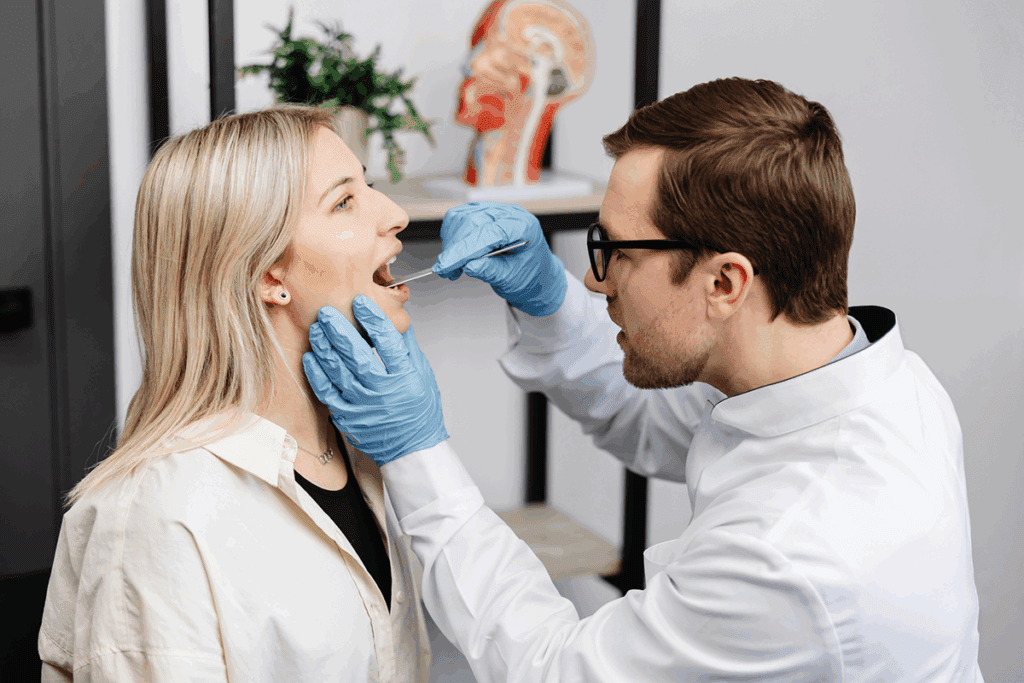Last Updated on November 25, 2025 by Ugurkan Demir

Feeling chest and throat tightness can be scary. At Liv Hospital, we get it and aim to give you top-notch care. We’ll cover seven common reasons for this symptom and important signs to look out for . Learn 7 main causes of chest throat tightness and when you should seek medical attention.
Tightness in the chest and throat can mean different things. It could be something simple or serious. We want to help you know when to get medical help and understand these symptoms better.

Chest and throat tightness can signal serious health issues. It’s important to know the symptoms to understand how serious they are. We’ll look at common signs and what they might mean for your health.
Pain or discomfort in the chest and trouble swallowing are common signs. You might also feel tightness or constriction in your throat. Other symptoms like shortness of breath, dizziness, or nausea can also occur. Being aware of these symptoms helps you know when to get medical help.
If you have severe chest pain or trouble breathing, call 911 right away. Look out for other emergency signs like severe pain or pressure in the chest, confusion, or a severe headache. Spotting these signs quickly can save lives.
| Symptom | Description | Action |
| Chest Pain | Discomfort or pain in the chest area | Seek immediate medical attention if severe |
| Difficulty Swallowing | Trouble swallowing food or liquids | Consult a doctor if persistent |
| Throat Tightness | Feeling of constriction in the throat | Monitor and seek help if it worsens |

Cardiac conditions are a big reason for chest and throat tightness. They need quick medical help. Symptoms like chest pain, shortness of breath, and fatigue are common. Knowing these signs is key for fast treatment.
Acute coronary syndrome (ACS) is when heart blood flow stops suddenly. This can lead to a heart attack. Symptoms include chest pain or discomfort, feeling weak, and arm or shoulder pain.
A heart attack damages the heart muscle because of blood flow lack. Spotting these signs early is vital to avoid lasting harm.
Angina pectoris is chest pain from the heart not getting enough oxygen. It’s often due to narrowed or blocked arteries. Angina feels like chest pressure or squeezing and can cause shortness of breath.
It’s a sign the heart is under stress. You should see a doctor.
Telling heart pain from other types is important. Heart pain feels like squeezing or pressure in the chest. It might spread to arms, back, or jaw. It can also cause shortness of breath, nausea, or tiredness.
If you have these symptoms, seek help right away. They can be severe or last a long time.
Knowing about cardiac chest pain helps find the cause and the right treatment. Always talk to a doctor for a proper check-up and diagnosis.
Chest and throat tightness often come from respiratory problems. These include asthma, COPD, and pulmonary embolism. These issues can cause mild discomfort or serious health risks. It’s important to know these causes for the right treatment.
Asthma is a long-term condition that makes breathing hard. It causes wheezing, coughing, and chest tightness. When an asthma attack happens, breathing gets even harder.
Common asthma triggers are allergens, infections, and environmental factors. To manage asthma, avoid these triggers and use inhalers.
Chronic Obstructive Pulmonary Disease (COPD) makes breathing tough. It includes emphysema and chronic bronchitis. These can cause coughing, wheezing, and shortness of breath.
A pulmonary embolism happens when a blood clot blocks a lung artery. It’s very serious and needs quick medical help. Symptoms include sudden chest pain, shortness of breath, and coughing up blood.
If you have symptoms of a pulmonary embolism, seek medical help right away.
Respiratory problems are a big reason for chest and throat tightness. Knowing the symptoms and the conditions can help get the right medical care.
Gastrointestinal problems can cause discomfort in the upper chest and throat. It’s important to find the right diagnosis. These issues can sometimes look like serious heart problems.
Acid reflux and GERD can make the upper chest and throat feel tight. This happens when stomach acid goes back up into the esophagus. It irritates the lining and causes pain.
Symptoms of Acid Reflux and GERD:
Esophageal spasms are when the esophagus contracts too much. This can cause chest pain and trouble swallowing. Swallowing disorders, like dysphagia, can also make the throat and chest feel tight.
Understanding these conditions is key to telling them apart from heart problems.
| Condition | Primary Symptoms | Differential Diagnostic Considerations |
| Acid Reflux/GERD | Heartburn, regurgitation, difficulty swallowing | Symptom correlation with meals, response to antacids |
| Esophageal Spasms | Chest pain, difficulty swallowing | Manometry for esophageal pressure measurement |
| Swallowing Disorders (Dysphagia) | Difficulty swallowing, sensation of food getting stuck | Endoscopy, barium swallow studies |
Gastrointestinal problems can be mistaken for heart issues because of similar symptoms. For example, chest pain from acid reflux or spasms can be mistaken for a heart attack.
Getting a detailed medical check-up is vital to figure out why the upper chest and throat feel tight. Knowing about gastrointestinal causes helps doctors give better diagnoses and treatments.
Anxiety and psychological factors can cause chest and throat tightness. This symptom puzzles many people. It’s important to understand these factors for better care.
Anxiety can make you feel physical discomfort. The link between mind and body is complex. It can lead to feeling tight in the chest and throat.
Panic attacks are intense fear episodes. They can feel like heart attacks. Symptoms include chest pain, fast heart rate, and feeling like you’re going to die.
This chest pain can be scary. But, it’s not usually a heart problem. It’s more about acute anxiety.
Chronic anxiety can cause ongoing physical symptoms. Muscle tension is a common issue. It makes you feel tight in the chest and throat.
People with chronic anxiety often have other physical complaints. These can include stomach problems and muscle pain. Treating the anxiety is key to managing these symptoms.
To stop stress-related tightness, we need a multi-faceted approach. This includes recognizing anxiety’s role and managing stress. Sometimes, professional help is needed.
Deep breathing, muscle relaxation, and meditation can help. Cognitive-behavioral therapy (CBT) is also helpful. It tackles the psychological factors behind anxiety.
By tackling anxiety and its psychological roots, we can manage chest and throat tightness better. This improves our overall well-being and quality of life.
Allergic reactions can cause tightness in the chest and throat. It’s important to know how to manage allergies to avoid this.
Food or environmental allergies can cause many symptoms. These can range from mild to severe. Some common signs include:
Spotting these signs early is key to handling them well.
Anaphylaxis is a severe allergic reaction that’s a medical emergency. It can cause:
Anaphylaxis is a medical emergency. If you or someone else has these symptoms, call 911 or your local emergency number right away.
Effective allergy management can stop chest and throat tightness. Here’s how:
| Strategy | Description |
| Avoiding Known Allergens | Stay away from foods or things that trigger allergic reactions. |
| Carrying Emergency Medication | For severe allergies, always have an EpiPen or other emergency meds with you. |
| Seeking Medical Advice | Talk to doctors to get a plan for managing your allergies. |
By understanding and managing allergies, you can lower the chance of feeling tight in your chest and throat due to allergies.
Infections cause throat and chest tightness in millions worldwide. When the body finds an infection, it gets inflamed. This can make the throat and chest feel tight. Knowing the different infections that cause these symptoms is key for treatment.
Strep throat and tonsillitis can make your throat very uncomfortable. Strep throat is caused by a bacterium and is very contagious. It can make your throat very sore and swollen. Tonsillitis, which is inflammation of the tonsils, can also make your throat tight and hard to swallow. Seeing a doctor is important to avoid serious problems and to feel better.
Bronchitis and pneumonia can also make your chest feel tight. Bronchitis is when the bronchial tubes get inflamed, leading to coughing and mucus. Pneumonia is an infection in the lungs that can make your chest tight, cause coughing, and make it hard to breathe. Both can be serious, but are more dangerous for the elderly and young children.
COVID-19, caused by the SARS-CoV-2 virus, can cause chest tightness among other symptoms. The severity of COVID-19 can vary a lot, from mild to very serious. Chest tightness in COVID-19 can be with other symptoms like cough, fever, and shortness of breath. It’s important to understand the link between COVID-19 and respiratory symptoms to manage the disease and stop it from spreading.
Musculoskeletal factors are a big reason for chest and throat tightness. This can happen because of bad posture or certain health issues. Knowing these causes is key to feeling better.
Poor sitting posture can strain your muscles, causing chest pain. This is because leaning forward puts extra stress on your chest and shoulders. Correcting posture and stretching regularly can ease this pain.
Costochondritis is an inflammation of the cartilage between the ribs and sternum. It can feel like heart pain, making it important to get a proper diagnosis. Symptoms include sharp chest pains or tenderness.
Problems with the cervical spine, like herniated discs or spinal stenosis, can cause throat pain. This happens when nerves in the neck irritate or compress. Physical therapy and changing how you sit can help manage these symptoms.
The table below lists the main musculoskeletal causes of chest and throat tightness:
| Cause | Symptoms | Management |
| Poor Posture | Chest pain when sitting, strain on chest and shoulder muscles | Correcting posture, regular stretching |
| Costochondritis | Sharp pains or tenderness in the chest wall | Anti-inflammatory medication, rest |
| Cervical Spine Issues | Referred pain or discomfort to the throat area | Physical therapy, postural adjustments |
By knowing the musculoskeletal causes of chest and throat tightness, you can get the right treatment. You can also make changes in your lifestyle to feel better.
When you feel chest and throat tightness, it’s important to notice other symptoms too. These symptoms often show up together, helping doctors figure out what’s wrong and how to fix it.
Symptom clusters are when several symptoms appear together. For chest and throat tightness, common symptoms include shortness of breath, neck pain, and fatigue. Knowing these clusters helps doctors find the main cause of the problem.
A medical expert once said,
“The presence of multiple symptoms can significantly impact the diagnosis and treatment plan. It’s not just about treating the chest tightness; it’s about understanding the overall clinical picture.”
Chest discomfort and feeling tired can be scary, as they might mean something serious is going on. Shortness of breath and neck pain are also important symptoms. They can point to heart problems, breathing issues, or even anxiety.
If you have these symptoms, it’s key to see a doctor. They can look at all the symptoms and decide the best treatment.
Knowing about the symptoms of chest and throat tightness helps people get the right care. This way, they can get better faster.
Chest and throat tightness can signal many health issues. Finding the cause is key. A detailed check-up is needed to figure out what’s wrong.
Doctors use several tests to find the cause of chest and throat tightness. These include:
The treatment depends on what’s causing the tightness. For example:
There are also ways to help at home. These include:
To prevent and manage chest and throat discomfort, we need a few key steps. First, we must understand what causes these issues. Then, we should live a healthy lifestyle and watch for signs of serious problems.
Many things can lead to chest and throat pain. These include heart problems, breathing issues, stomach problems, anxiety, allergies, infections, and muscle issues. Knowing these causes helps us tackle the problem better.
Managing these issues is key to avoiding pain. This means getting the right treatment and making lifestyle changes. By being proactive and making smart choices, we can feel better and live healthier.
Living a healthy lifestyle is important. This means eating well, exercising regularly, and managing stress. Also, knowing the signs of serious problems like heart attacks or allergic reactions is vital. By following these tips, we can lower our chances of feeling chest and throat pain.
Symptoms include chest pain or discomfort, trouble swallowing, and throat tightness. You might also feel short of breath, have neck pain, or feel tired.
Get help right away if you think you’re having a heart attack or a severe allergic reaction. If you’re not sure, it’s always better to get checked out.
Yes, anxiety can make you feel tight in your chest and throat. Panic attacks and chronic anxiety can make symptoms seem serious.
Heart problems like acute coronary syndrome and angina can cause chest tightness. These happen when the heart doesn’t get enough blood, leading to pain or a heart attack.
Issues like asthma, COPD, and pulmonary embolism can cause tightness. These problems can make breathing hard and even block airways.
Yes, problems like acid reflux and GERD can feel like heart issues. Esophageal spasms and swallowing disorders can also cause tightness.
Allergic reactions, from mild to severe, can cause tightness. Knowing the signs of anaphylaxis is key to quick action.
Infections like strep throat, tonsillitis, bronchitis, pneumonia, and COVID-19 can cause tightness. These can be very uncomfortable and serious.
Yes, issues like poor posture, costochondritis, and cervical spine problems can cause tightness. These often come from mechanical stress or injury.
Tests like ECGs, blood tests, and imaging studies are used. They help find the cause and guide treatment.
Treatment depends on the cause, from meds to lifestyle changes. Home remedies and self-care are also important for managing symptoms.
Preventing and managing discomfort involves medical treatment, lifestyle changes, and knowing warning signs. Understanding causes and taking steps can reduce symptoms and improve health.
Subscribe to our e-newsletter to stay informed about the latest innovations in the world of health and exclusive offers!